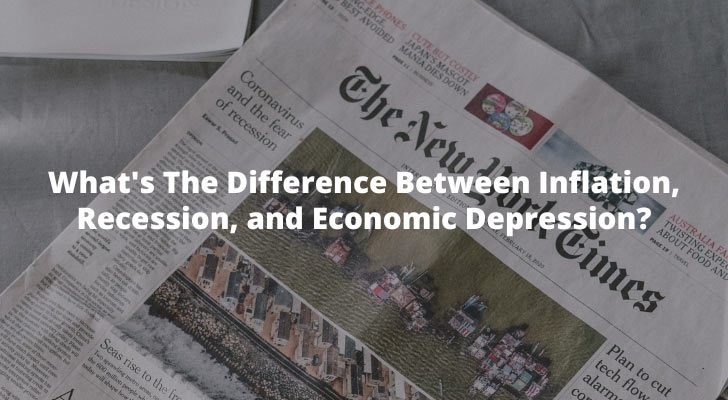Inflation, recession, and economic depression are all terms that describe different economic states. Inflation is when prices rise and the value of money falls, a recession is when there is a decrease in economic activity, and economic depression is when the economy experiences a prolonged period of low activity. While they are all different, they can often lead to each other. For example, if inflation leads to a decrease in spending, that could lead to a recession. Or if a recession leads to an increase in unemployment, that could lead to an economic depression.

What is Inflation?
Inflation is an increase in the prices of goods and services. This rise in prices can be caused by various factors, such as an increase in the money supply, higher demand for goods and services, or a decrease in the production of goods and services. Inflation can have both positive and negative effects though.
Positive effects of inflation include providing incentives for businesses to invest and expand their operations, as well as encouraging consumers to save money. Negative effects of inflation include decreasing the purchasing power of consumers and businesses, as well as leading to higher levels of unemployment.
What is a Recession?
The term recession is used to describe a period of economic decline. It is typically marked by a decrease in the gross domestic product (GDP), an increase in unemployment, and a decline in business activity.
A recession can be caused by many factors, including a decrease in consumer demand, an increase in interest rates, or a decrease in government spending. A country’s economy may also be impacted by global recessionary trends.
Recessions are generally considered to last for two consecutive quarters of negative GDP growth. However, the duration and severity of a recession can vary greatly depending on the underlying cause.
While recessions are often associated with negative effects, such as job losses and lower incomes, they can also present opportunities for businesses and investors. For example, recessions can lead to lower costs for raw materials and labor, which can help improve profitability.
What is Economic Depression?

While a recession is typically defined as two consecutive quarters of negative economic growth an economic depression is a more severe downturn that lasts for several years. Economic depressions are rarer than recessions, but they can have a devastating impact on economies and society.
While there is no precise definition of an economic depression, it is generally considered to be a more severe form of recession. Economic depressions are characterized by high levels of unemployment, and falling prices (deflation), and often lead to widespread poverty and suffering. In the past, economic depressions have often been caused by financial crises, such as bank failures or stock market crashes.
The most recent example of economic depression was the Great Depression of the 1930s, which was triggered by the Wall Street Crash of 1929. The Great Depression led to high levels of unemployment and poverty around the world. It also had a major impact on politics, with the rise of fascist regimes in Europe and elsewhere.
While economic depressions are relatively rare, they can have a significant impact on economies and society. If you think you may be experiencing an economic depression, it is important to seek professional help.
How do Inflation, Recession, and Economic Depression Impact the Stock Market?
Inflation, recession, and economic depression can all have different impacts on the stock market.
Inflation is when the prices of goods and services rise over time. This can cause the stock market to become volatile, as investors may buy or sell stocks based on their expectations of inflation. Inflation can also lead to a decrease in the value of stocks, as companies may have to raise prices to keep up with inflation.
A recession is when the economy slows down for a period of time. This can cause the stock market to drop, as investors may sell stocks in order to avoid losses. A recession can also lead to an increase in the value of bonds, as they are considered to be a safe investment during times of economic uncertainty.
An economic depression is a prolonged period of economic decline. This can cause the stock market to crash, as investors may panic and sell all of their stocks. Economic depression can also lead to a complete collapse of the financial system, which would have a devastating impact on the stock market.
10 Things We Can Do To Protect Our Investments
We all want to protect our investments, whether it’s our money, our possessions, or even our time. But how can we do that? And what should we be doing to safeguard what’s important to us? Here are 10 things we can do to protect our investments.
#1 Review Your Portfolio Regularly

It's important to review your investment portfolio regularly - at least once every 6 months, if not more frequently. This will help you to make sure that your investments are still in line with your goals and objectives, and that they're performing as well as you'd hoped.
If you don't have the time or inclination to review your portfolio yourself, you can always hire a financial advisor to do it for you. Just be sure to choose someone who is reputable and has experience dealing with investment portfolios.
#2 Diversify Your Investments
As we all know, investing is essential if we want to secure our financial future. But what many people don't realize is that it's just as important to diversify your investments. Diversifying your investments essentially means spreading the risk around. This means that if one investment fails, you have others that can help offset the loss. You should consider diversifying your investments in 2 different ways;
- Different types of assets - stocks, bonds, precious metals, mutual funds, etc.
- Different sectors - technology, medical, finance.
The most important thing is to make sure that you are diversified. Don't put all of your eggs in one basket. By diversifying your investments, you will be better prepared for whatever the future may hold.
#3 Consider Alternative Investments
Alternative investments are any investment that is not a traditional investment, such as stocks or bonds. Some examples of alternative investments include real estate, hedge funds, private equity, and venture capital.
Alternative investments can be a great way to diversify your portfolio and reduce risk. Research and understanding the risks are essential before investing in anything because these investments can be very volatile.
#4 Use Stop-Loss Orders

When investors purchase securities, they expose themselves to the risk of losses if the market price of the security falls. One way to protect against this risk is to place a stop-loss order with their broker. A stop-loss order is an order to sell a security when it reaches a certain price, known as the stop price. By placing a stop-loss order, investors can limit their potential losses on a security position.
There are two types of stop-loss orders: absolute and relative.
An absolute stop-loss order is where you set a specific price. For example, an investor might place an absolute stop-loss order at $10 per share for a stock they own. If the stock falls to $10 per share, the order will be triggered and the stock will be sold.
A relative stop-loss order is placed as a percentage below the current market price. For example, if an investor owns a stock that is currently trading at $10 per share, they might place a relative stop-loss order at 10%, which would translate to a Stop Price of $9 per share. If the stock falls to $9 per share, the order will be triggered and the stock will be sold.
Stop-loss orders can help investors protect their investments from downside risk, but it's important to remember that these orders are not foolproof. First, there is no guarantee that security will reach the Stop Price before continuing its decline. Second, once an order is triggered
#5 Stay Informed
It is important to stay informed about what is happening in the world of investments. There are many ways to do this, including reading investment news, following industry analysts on social media, and subscribing to newsletters from investment firms.
When it comes to protecting our investments, knowledge is power. By staying informed about the latest developments in the world of investing, we can make more informed decisions about where to put our money. And that can lead to a better chance of success in achieving our financial goals.
Free Report: Buyer Beware! Scams & gimmicks to watch out for.
#6 Have A Long-Term Strategy
When it comes to investing, we must think long-term. We should have a strategy and plan in place for how we want to grow our money. This way, we can make informed decisions that will help us reach our goals.
Here are a few things to consider when crafting your long-term investment strategy:
1. What are your financial goals?
Do you want to retire early? Save for a child’s education? Build up an emergency fund? Having specific goals in mind will help you determine the best way to invest your money.
2. How much risk are you comfortable with?
Some investments come with more risk than others. If you’re not comfortable taking on too much risk, you may want to focus on more conservative investments. But keep in mind that these often have lower returns as well.
3. What is your time horizon?
How long do you plan on investing? If you have a longer time horizon, you can afford to take on more risk since you’ll have time to recover from any short-term losses. But if you need to access your money sooner, you’ll need to be more cautious with your investment choices.
#7 Don't Time the Market

Don't Time the Market - it's a long way to go.
There's an old saying on Wall Street that goes, "The market can stay irrational longer than you can stay solvent." In other words, trying to time the market is a fool's errand. The simple fact is that no one knows what the market is going to do in the short term. Not even the so-called experts.
So what should you do instead?
The best way to protect your investments is to have a diversified portfolio that is properly allocated for your risk tolerance and investment goals. And then, once you've done that, simply let it ride. Don't try to time the market. Don't get caught up in the latest hot stock tip. Just sit back and let your investments work for you over the long haul.
#8 Avoid Emotional Decisions
When it comes to investing, it’s important to avoid letting emotions guide your decisions. This can be difficult, especially when you see the markets fluctuating and your portfolio value going up or down. However, basing your investment choices on how you feel in the moment can lead to costly mistakes.
Instead of reacting to short-term changes, take a step back and think about your long-term goals. Stay focused on your strategy and remember that market fluctuations are normal. If you stick to your plan, you’re more likely to reach your goals.
If you’re feeling stressed about your investments, talk to a financial advisor. They can help you understand what’s happening in the markets and make sure your portfolio is still on track.
#9 Be Wary of Get-Rich-Quick Schemes
There are a lot of so-called "get-rich-quick" schemes out there, and it can be tempting to try one of them. The desire to become wealthy is universal, after all. But the truth is, most of these schemes are nothing more than scams.
So how can you tell if a get-rich-quick scheme is legitimate or not? Here are some things to look out for:
- Promises of easy money: If it sounds too good to be true, it probably is. Any program that promises you'll make a lot of money without any effort on your part is likely a scam.
- Pressure to buy now: Scammers will often try to pressure you into buying their program right away by saying that it's a limited-time offer or that supplies are limited. Don't fall for it!
- Upfront fees: Legitimate programs won't require you to pay any upfront fees. If someone asks you to pay before you can start making money, that's a red flag.
- Unclear details: A scammer will often omit important details or give vague descriptions about how the program works. If you can't get clear answers to your questions, walk away.
- No risk guarantees: There's no such thing as a risk-free investment, so be wary of any program that claims otherwise.
If you're thinking about investing in a get-rich-quick scheme, do your research first. Check out the company with the Better Business Bureau and other consumer protection organizations. And never invest more money than you can afford to lose.
#10 Seek Professional Advice
Seek professional advice to be sure that we are doing everything possible to protect our assets. While there is a lot of information available online and from friends and family, it’s always best to ask an expert before making any decisions about investments.
If you think independent financial advisors are expensive, it's not always the case. Many of them offer consultation free of charge. They may recommend you take up a specific investment so that they can earn a commission, but you don't have to take it. Financial advisors are there to help you understand your options and make the best choices for your unique situation.
How I "Finally" Make Over $7,000 Monthly Income
"The most valuable thing I've ever done!"

Thank you so much for the great post, it’s very educational. I’ve always thought inflation and recession were confusing, now I know what they exactly are, and also how serious economic depression can be. This is a fantastic site, I must say. Thanks for all your help.
Thanks for your comment Rory, appreciate it. If you have any questions or feedback don’t hesitate to message us at any time!